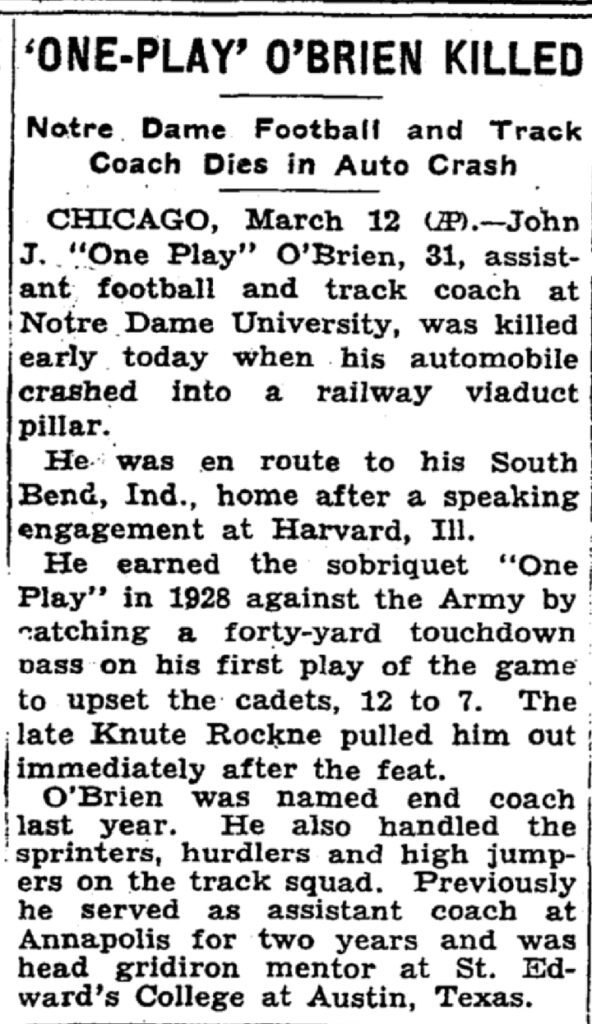In popular music, there have been many “one hit wonders.” In the 1960s and 70s, we had “The Lion Sleeps Tonight” by The Tokens, “Wipe Out” by The Surfaris, “96 Tears” by Question Mark and the Mysterians and “It Never Rains in Southern California” by Albert Hammond. One hit. The performers had never been heard of before and were never heard of after.
In football, one of the all-time great one hit, or one play, wonders played a key role in the legendary history of Notre Dame football.
Johnny O’Brien, who died 87 years ago tomorrow (March 12, 1937) was a quiet, spindly, unassuming young man from Los Angeles when he enrolled at Notre Dame in 1927. During his stay at Notre Dame, he became a recognized track star and actually set a world record in the 60-yard hurdles. While setting a world record as a student Notre Dame was an amazing feat, O’Brien’s lasting fame is tied to a single play performance on the football field as a sophomore in 1928.
The Army game that season is famous for Coach Knute Rockne‘s halftime speech to his overmatched Notre Dame team. This was the least successful of all of Rockne’s teams, as it accounted for four losses — one-third of all of Rockne’s teams combined. The team struggled throughout the 1928 season, while the Army team was undefeated and thought to be the best team in the country.
Rockne, with the game scoreless at halftime, told his team the story of George Gipp on his deathbed and Gipp’s request that “One day, when the going gets rough, to go out there and win one for the Gipper.“ This was the game and the stage was set.
The score of the game was tied 6-6 late in the fourth quarter. Surprisingly, on fourth down Rockne pulled the starting end and inserted, for the first time in this game, the seldom played O’Brien in his place. O’Brien was an unknown and had no accomplishments of note on the football field.
Johnny Niemiec, Notre Dame’s accomplished halfback and punter, received the ball on fourth down. Niemiec rolled out and knew he would throw the ball if O’Brien was open. “It was reverse pass“ Niemiec later said. O’Brien was open and the ball was thrown high and true, up there for O’Brien to grab it if he could.
O’Brien went up, came down juggling the ball, and was falling forward as he gathered it in and went over the goal line. That one play put O’Brien in Notre Dame football lore, as a struggling Notre Dame team beat the highly touted, undefeated and very confident Army team, 12-6.
As O’Brien came out of the game and returned to the bench, he was hugged by Rockne. Legend has it that this is the only time Rockne ever hugged a player on the sidelines.
O’Brien went on to play on the Rockne teams of 1929 and 1930, the latter a national championship team. No record appears of any notable accomplishments or performances during those years. However, O’Brien having put the lackluster ND team over the undefeated Army team in 1928 was soon and forever recognized as “One Play” O’Brien.
That particular play has been rated by Notre Dame football historians as one of the top passing plays in the history of Notre Dame football. Some put it behind onlyTom Clements’ 1973 Sugar Bowl pass to Robin Weber to seal the win against Alabama and to win the national championship.
In March 11, 1937, O”Brien, then a Notre Dame assistant coach, had gone to Illinois to show ND’s “Highlights of the Season” to a Knights of Columbus gathering. On the way home late that night, which was actually early in the morning on March 12, while on Route 6 outside of Chicago, his car hit a viaduct and he was dead at the scene.
The New York Times on March 13, 1937 ran a story noting O’Brien’s death with the headline ” ‘ONE-PLAY’ O’BRIEN KILLED; Notre Dame Football and Track Coach Dies in Auto Crash.”

O’Brien’s one play was very significant, far beyond helping post a win over the powerful Army team. Without the famous one play, by “One Play” O’Brien, the “Win One for the Gipper” speech would have been squandered and never immortalized as one of the all-time great half-time talks or left to be classically important in the movie, “Knute Rockne – All American,” help the career of Ronald Reagan or have a place for posterity.
President Reagan, who played George Gipp in the movie, picked up and forever enjoyed the nickname of “The Gipper,” In political campaigns and in matters contested before Congress, Reagan’s supporters would urge on supporters with the need to “Win one for the Gipper,”
One tragic footnote to the 1928 Notre Dame-Army game is the fact that four of the game’s key performers suffered premature violent deaths. Rockne died in a 1931 plane crash, Notre Dame star running back Jack Chevigny died in Iwo Jima, Army star Red Cagle mysteriously died on a subway platform in 1942 and Johnny “One Play” O’Brien died in a tragic car accident in 1937.
A New York Times’ report of the 1928 Notre Dame-Army game focused on its improbable hero:
BY RICHARDS VIDMER
November 10, 1928
NEW YORK — The referee’s whistle blew taps for the Army today. Under the pent-up power of Knute Rockne’s nomads from Notre Dame the unbeaten eleven from West Point was buried in its first defeat of the season when the thrill of the whistle sounded the end of the game at the Yankee Stadium.
Through the gathering dusk, into which 85,000 pairs of eyes were peering, the end came with Army on the Notre Dame 1-yard line and Notre Dame a touchdown to the good, gained in the last quarter on a 32-yard pass from Johnny Niemiec to Johnny O’Brien. The score was 12 to 6. Johnny O’Brien made only one play during the game, but that one meant triumph for the South Bend cyclone and the shattered record of an Army eleven that fought desperately, determinedly, but in vain, until the final whistle sounded taps over their beaten bodies.
For three periods, Johnny O’Brien sat on the sidelines, huddled under his blanket with a hope in his heart that he might be called on to do something for Notre Dame. And if he was called on, he would make good. Johnny O’Brien was still on the bench through most of the final quarter. The score was 6-6, minutes were ticking away and he hadn’t been called on. Notre Dame was marching down the field with steady strides. Notre Dame was apparently headed for another touchdown. Then two things happened. First a bad pass from the center cost Notre Dame sixteen yards and there was a sudden command from Knute Rockne.
Obeying that command, Johnny O’Brien flung his blanket aside and dashed on to the field, reporting to the referee. O’Brien barked a string of numbers and as the ball was snapped back to Niemiec he winged his way down the field. The goal line was 32 yards away when he started in full flight, but on he went until it was within stepping distance. Then he turned. Timing O’Brien’s speed exactly, Niemiec took his time in handling the ball and then he flung it through the air. When Johnny O’Brien turned his head he saw the ball floating down from above. He reached his arms upward and grasped it and then he fell. But he fell over the goal line.
That one play was all that Johnny O’Brien made. He didn’t even wait for Niemiec to attempt the extra point, which failed to gain. Johnny was through. He dashed for the side lines, his work done, and done well. He had scored the touchdown that brought victory to Notre Dame, defeat to the Army and another upset to a football season that is getting more topsyturvy every day.
